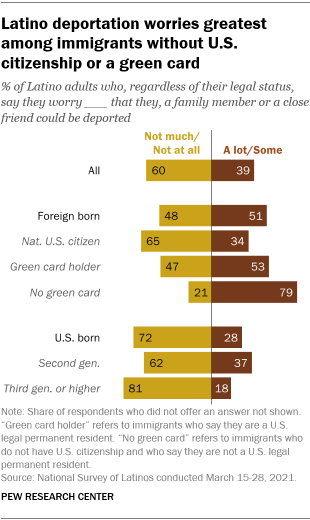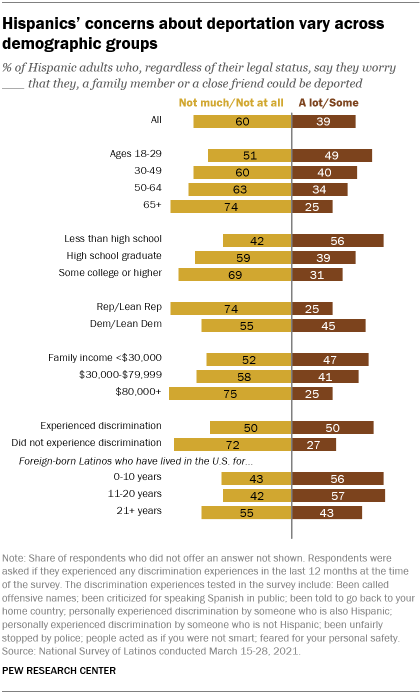Deportation remains an important concern for many U.S. Latinos. Overall, nearly four-in-ten Latinos (39%) say they worry that they, a family member or someone close to them could be deported. That concern is even higher among immigrants, according to a Pew Research Center survey of Latino adults conducted in March 2021.
About half of immigrant Latinos (51%) say they worry a lot or some that they or someone they know could be deported – a higher share than among U.S.-born Latinos, 28% of whom say they have the same concerns.
Among Latino immigrants, concerns about deportation vary widely and are related to immigration status. Nearly eight-in-ten immigrants who are not U.S. citizens and do not have a green card (79%) say they worry a lot or some about themselves or someone close to them being deported. This is a group that is likely in the country without authorization. Meanwhile, 53% of immigrants who do not hold U.S. citizenship but have a green card say they worry that they or someone close to them could be deported. By contrast, about one-third of Latino immigrants who are naturalized U.S. citizens worry about deportation.
Pew Research Center conducted this study to understand the concerns among Hispanics living in the 50 states and the District of Columbia that they or those close to them might be deported.
For this analysis we surveyed 3,375 U.S. Hispanic adults in March 2021. This includes 1,900 Hispanic adults on Pew Research Center’s American Trends Panel (ATP) and 1,475 Hispanic adults on Ipsos’ KnowledgePanel. Respondents on both panels are recruited through national, random sampling of residential addresses.
Recruiting panelists by phone or mail ensures that nearly all U.S. adults have a chance of selection. This gives us confidence that any sample can represent the whole population (see our Methods 101 explainer on random sampling), or in this case the whole U.S. Hispanic population.
To further ensure the survey reflects a balanced cross-section of the nation’s Hispanic adults, the data is weighted to match the U.S. Hispanic adult population by age, gender, education, nativity, Hispanic origin group and other categories. Read more about the ATP’s methodology.
Here are the questions used for our survey of Hispanic adults, along with responses, and its methodology.
Concerns about deportation among Latinos have changed little over the course of the COVID-19 pandemic and during the transition from Donald Trump’s presidency to Joe Biden’s. In December 2019, 44% of Latino adults said they worried a lot or some that they themselves, a family member or a close friend could be deported, a slightly higher share than in 2021. Meanwhile, the concerns of the group most worried about deportation changed little: In December 2019, 76% of those without U.S. citizenship or a green card worried at least some about deportation, and a similar share said this in 2021.
Removals of immigrants in the country without authorization by Immigration and Customs Enforcement were down considerably in fiscal year 2020 compared with fiscal 2019. Immigrant removals declined from 267,000 in 2019 to 186,000 in 2020, according to the agency. The agency’s administrative arrests, or arrests made in the interior U.S., experienced a similar decline from 143,000 to 104,000 during the same period.
Immigrants make up about one-third of the U.S. Latino population and about half of all Latino adults. While Latinos make up the largest share of unauthorized immigrants, unauthorized Latino immigrants account for somewhat less than 40% of the roughly 20 million Latino immigrants in the country and about one-in-eight of all U.S. Latinos, according to the Center’s most recent estimates. According to the survey, 53% of Latino adults say they know someone who is living in the U.S. without authorization.
Earlier in 2021, a Pew Research Center survey found that a clear majority of Latino adults (84%) said there should be a way for undocumented immigrants to stay in the country legally if certain requirements were met, compared with 69% of U.S. adults overall. Among Latinos, 88% of Democrats and Democratic-leaning independents held this view, as did 73% of Republicans and Republican leaners.
Deportation worries vary among U.S. Latinos. Among second-generation Latinos, those with at least one immigrant parent, 37% say they worry about deportation a lot or some, compared with 18% among third- or higher-generation Latinos (those with two U.S.-born parents). About eight-in-ten (81%) of the latter group say they do not worry much or at all about the deportation of themselves or someone they know.
The worry of deportation is more likely among Hispanics ages 18 to 29 (49%) than it is among Hispanics ages 50 to 64 (34%) and 65 and older (25%). Hispanics with less than a high school diploma are more likely than those with at least some college education to worry about deportation (56% vs. 31%). And Hispanics whose total family income in 2019 was less than $30,000 a year are more likely than those Hispanics whose family income was $80,000 or more to worry about the deportation of themselves or someone close to them (47% vs. 25%).
Hispanics who experienced at least one of eight specific forms of discrimination in the prior 12 months were more likely than those who did not experience any such forms of discrimination to say they worried a lot or some about deportation of themselves, a family member or a close friend (50% vs. 27%).
Note: Here are the questions used for our survey of Hispanic adults, along with responses, and its methodology.


